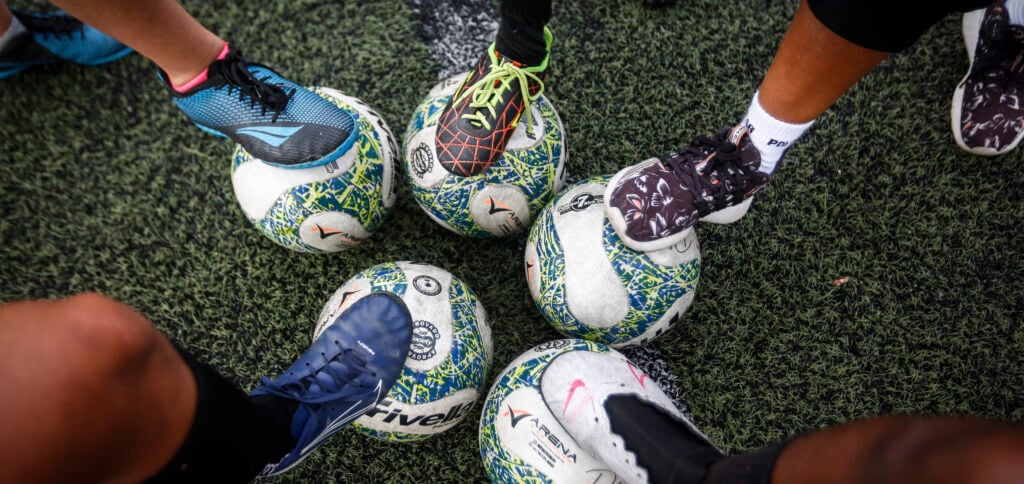Considered a pioneer in the sport, Mendes even created strategies to escape from police officers who were enforcing a decree promulgated in 1941 by then president Getúlio Vargas and which was in force until 1979.
ADVERTISING
The ban affected the development of football in Brazil, which will participate, led by striker Marta, in the World Cup in Australia and New Zealand (July 20 to August 20).
“My idea as a child was that the police arrested people when they did something wrong, and I didn’t feel, as I still do today, that I was doing something wrong,” the former midfielder, now 59, told AFP. .
In the early 1970s, in his hometown of Camaçari, 51 kilometers from Salvador (BA), Mendes offered ice cream to his friends so they could warn them of the police's arrival. She even dug a hole, which he called a “pit”, next to the field to hide.
ADVERTISING
When the police officers left, she returned to kick, a right earned with a firm hand and patience, as the boys initially refused to play with her. But the plan sometimes failed, and she was caught and taken to the police station.
“The police treated me well, but some said I couldn't play because football was for men. There I questionava: where was it written?”, he remembers. “I didn’t know there was a law that prohibited women from playing football.”
Strategies to “break the law”
Football associations in countries such as England, Germany and France also banned it, with several restrictions remaining in force between 1921 and 1970, but only Brazil adopted the measure with a law.
ADVERTISING
The veto emerged during the Vargas regime and was supported, among other things, by a “biomedical discourse” that considered women more fragile than men, therefore their “physical integrity should be protected”, according to researcher Silvana Goellner .
“This presence of women in public space challenges a norm, a representation of femininity, which was very powerful in that period as a mother figure, reserved for the domestic space”, adds Goellner.
The rule did not allow women to “practice sports incompatible with the conditions of their nature”, including football, rowing and fighting, although they were not explicitly mentioned.
ADVERTISING
The decree also did not mention sanctions, leaving room for each police station to impose its own. There are no records, however, of women arrested for violating the order. Generally, they were detained and released shortly after giving testimony.
“They never stopped playing, they created strategies to circumvent the law”, says the researcher, co-author of the book “Football pioneers ask for passage: knowing to recognize”.
Some dressed like men, played games at night, in private spaces, and ran in different directions when discovered to disorient the police and avoid being detained.
ADVERTISING
Useful to “circumvent” the agents, the maneuvers did not avoid opposition from their families. Also from men, who didn't want to play against or alongside women.
Developmental delay
Dilma Mendes, youngest of seven siblings, five of them men, remembers sitting in a chair at the Camaçari police station, praying that her father, her great accomplice, would rescue her. If her mother caught her, she knew it would takearia a “beating” for practicing a “man’s sport”.
“It was tough, coming home and being beaten by your brothers, being beaten by your mother and the next day you're ready to go back and play. It was a 'you die today and are reborn on the same day' thing, because if you leave it for another day, you're still dead. I saw many friends give up because of a process that was very cruel,” she says.
Mendes did not give up and built a career in futsal and professional football, regulated in 1983, four years after the ban fell amid pressure from feminist movements, at the end of the military dictatorship (1964-1985) and the dispute over the first women's international tournaments.
Brazil had “great players” who didn’t have “opportunities”, he says. “The ban was cruel, because it takes away your dream,” says Mendes through tears.
After retiring in 1995, she dedicated herself to her coaching career. She was the one who discovered the legendary Formiga, a former Seleção midfielder, and won the 7 FIFA 2019 World Cup as coach of the Brazilian team.
The veto, says Goellner, made historical documentation and the development of women's football in Brazil, five-time men's world champion, difficult.
“Without the ban, Brazil would already have a World Cup or Olympic gold in women's football,” said Aline Pellegrino, coordinator of women's competitions at the CBF, to the Spanish newspaper El País, in 2021.
Read also




